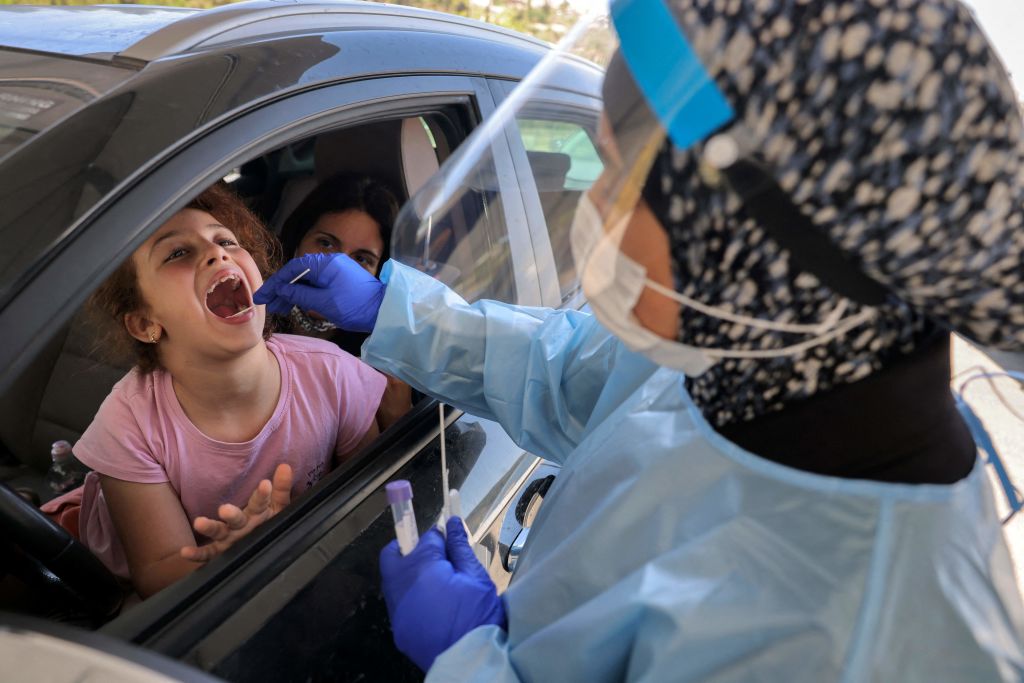We won't know how dangerous COVID-19's Delta variant is for children until after school starts


A free daily email with the biggest news stories of the day – and the best features from TheWeek.com
You are now subscribed
Your newsletter sign-up was successful
Children and teens are preparing to return to school across the U.S. as COVID-19's Delta variant continues to push up hospitalizations across the U.S., including at children's hospitals. From July 31 to Aug. 6, an average of 216 children with COVID-19 were being hospitalized a day in the U.S., just shy of the pandemic's January peak, according to Centers for Disease Control and Prevention data. Tennessee's children's hospitals will be full by the end of this week, the state's health department predicted Monday.
The looming question parents are staring down the beginning of the school year is this: Are more children getting sick and going to the hospital because the much more contagious Delta variant is infecting more children, or does the Delta variant make children sicker than previous strains?
Pediatric specialists and epidemiologists don't have a good answer yet.
The Week
Escape your echo chamber. Get the facts behind the news, plus analysis from multiple perspectives.

Sign up for The Week's Free Newsletters
From our morning news briefing to a weekly Good News Newsletter, get the best of The Week delivered directly to your inbox.
From our morning news briefing to a weekly Good News Newsletter, get the best of The Week delivered directly to your inbox.
Most of the children who contract COVID-19 "are not very sick," Dr. Wassam Rahman, medical director of the pediatric emergency center at Johns Hopkins All Children's Hospital in St. Petersburg, Florida, tells The New York Times. "But as you might imagine, families are scared." And since hospitalizations are a lagging indicator, "I think time will tell, really," if the Delta strain is more severe in children, Rahman added. "We need at least a month, maybe two months before we get a sense of trends."
That's an especially long wait for kids under 12 returning to school still ineligible for the COVID-19 vaccines, and their parents.
"There's no firm evidence that the disease is more severe," Dr. Jim Versalovic, interim pediatrician in chief at Texas Children's Hospital in Houston, tells the Times. Nationally, about 1 percent of infected children end up in the hospital and 0.01 percent die, the American Academy of Pediatrics says. Still, more children with COVID-19 means more children hospitalized with the virus, Versalovic said. "It's a numbers game at this point."
Until more data comes in, parents and children age 2 and up wear masks in larger crowds, AAP's Sean O'Leary tells The Washington Post. "The most important thing that we can do is everyone who is eligible to be vaccinated, be vaccinated." Dr. Richard Malley, a pediatric infectious disease specialist at Boston Children's Hospital, agreed. "The safest way to never find out whether Delta is more aggressive to children than the original strain is to really enhance vaccination," he told the Times.
A free daily email with the biggest news stories of the day – and the best features from TheWeek.com
Peter has worked as a news and culture writer and editor at The Week since the site's launch in 2008. He covers politics, world affairs, religion and cultural currents. His journalism career began as a copy editor at a financial newswire and has included editorial positions at The New York Times Magazine, Facts on File, and Oregon State University.
-
 Why is the Trump administration talking about ‘Western civilization’?
Why is the Trump administration talking about ‘Western civilization’?Talking Points Rubio says Europe, US bonded by religion and ancestry
-
 Quentin Deranque: a student’s death energizes the French far right
Quentin Deranque: a student’s death energizes the French far rightIN THE SPOTLIGHT Reactions to the violent killing of an ultra-conservative activist offer a glimpse at the culture wars roiling France ahead of next year’s elections.
-
 Secured vs. unsecured loans: how do they differ and which is better?
Secured vs. unsecured loans: how do they differ and which is better?the explainer They are distinguished by the level of risk and the inclusion of collateral
-
 Trump HHS slashes advised child vaccinations
Trump HHS slashes advised child vaccinationsSpeed Read In a widely condemned move, the CDC will now recommend that children get vaccinated against 11 communicable diseases, not 17
-
 FDA OKs generic abortion pill, riling the right
FDA OKs generic abortion pill, riling the rightSpeed Read The drug in question is a generic version of mifepristone, used to carry out two-thirds of US abortions
-
 RFK Jr. vaccine panel advises restricting MMRV shot
RFK Jr. vaccine panel advises restricting MMRV shotSpeed Read The committee voted to restrict access to a childhood vaccine against chickenpox
-
 Texas declares end to measles outbreak
Texas declares end to measles outbreakSpeed Read The vaccine-preventable disease is still spreading in neighboring states, Mexico and Canada
-
 RFK Jr. shuts down mRNA vaccine funding at agency
RFK Jr. shuts down mRNA vaccine funding at agencySpeed Read The decision canceled or modified 22 projects, primarily for work on vaccines and therapeutics for respiratory viruses
-
 Measles cases surge to 33-year high
Measles cases surge to 33-year highSpeed Read The infection was declared eliminated from the US in 2000 but has seen a resurgence amid vaccine hesitancy
-
 Kennedy's vaccine panel signals skepticism, change
Kennedy's vaccine panel signals skepticism, changeSpeed Read RFK Jr.'s new vaccine advisory board intends to make changes to the decades-old US immunization system
-
 Kennedy ousts entire CDC vaccine advisory panel
Kennedy ousts entire CDC vaccine advisory panelspeed read Health Secretary RFK Jr. is a longtime anti-vaccine activist who has criticized the panel of experts
